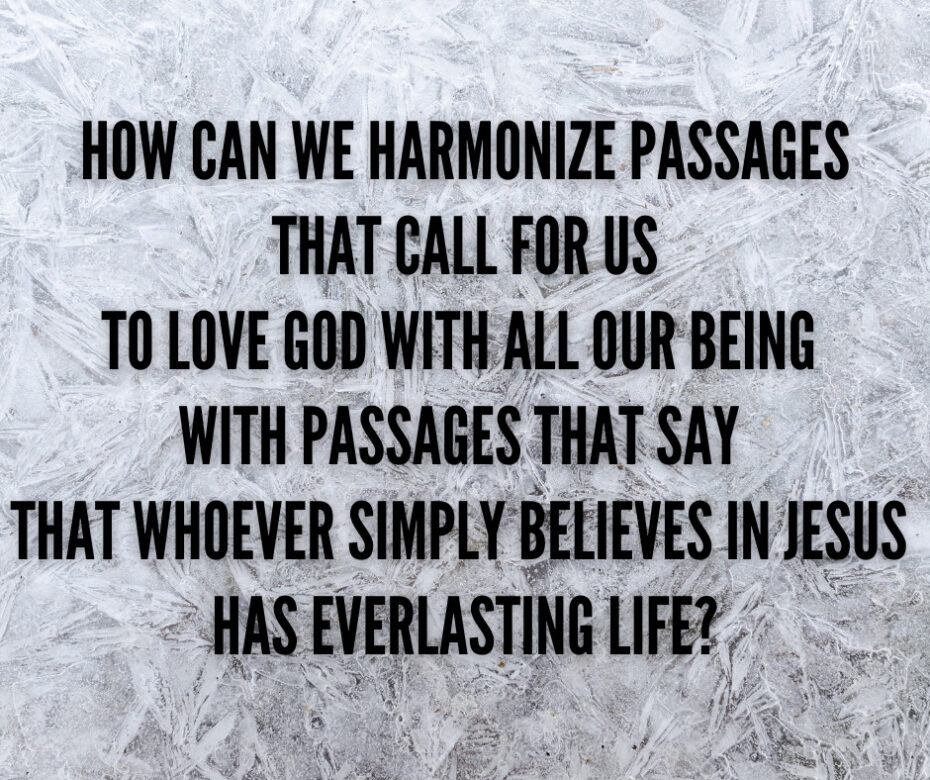A. S., a reader, asks this fascinating question:
In relation to Matthew 22:37 and John 3:16—in your own understanding what is the right interpretation of the two verses in relation to each other? Thanks, and stay blessed in Jesus’ name!
The Lord was often asked about the greatest commandments in the OT. The reason was simple. The Jewish leaders and Jewish people of the first century believed in salvation by law keeping. Of course, there were a small number of exceptions (John 1:11-12). But most rejected the idea that anyone could have everlasting life simply by believing in the Lord Jesus Christ—or anyone for that matter. They did not believe that faith in God the Father guaranteed everlasting life, either.
John 5:39-40 answers the question A. S. has posed. There the Lord said: “You search the Scriptures, for in them you think you have eternal life; and these are they which testify of Me. But you are not willing to come to Me that you may have life.” Why did they search the OT? Because they thought in the Scriptures they would find the answer to how to have eternal life, which in their mind was by doing the works of God that are mandated in the law (cf. John 6:28-29). The Lord told them that the OT indeed does tell how a person can have eternal life, but it is not by the works of the law, but by believing in the One testified to in the OT. The Scriptures “testify of Me.” Sadly Jesus pointed out the sad truth: “But you are not willing to come to Me [= believe in Me, John 6:35] that you may have life.”
Matthew 22:37 is Jesus’ answer to the great commandment question. He said, “You shall love the Lord your God will all your heart…[and] you shall love your neighbor as yourself.” He was not indicating what a person must do to have everlasting life. He was indicating what a person must do to please God. The believer at the time of Christ, like the believer today, should glorify God by loving Him and by loving our neighbors. But the condition of everlasting life has always been by believing in the Lord Jesus Christ for that life. (Prior to Jesus’ baptism, the condition was believing in the coming Messiah for that life. Compare Gen 3:15; 15:6; Rom 4:1-8. But once the Lord Jesus was publicly declared by the Father to be His beloved Son, then faith had to be specifically in Jesus for one’s eternal salvation.)
There are thousands of commands in the Bible. None of them tell us what we must do to have everlasting life. The sole condition of everlasting life is believing in the Lord Jesus Christ for that life.
The Lord said in John 3:16, “For God so loved the world that He gave His only begotten Son, that whoever believes in Him should not perish but have everlasting life.” That is the promise of everlasting life. Compare John 5:24; 6:35, 47; 11:25-27; Acts 16:31; Gal 2:16; Eph 2:8-9; 1 Tim 1:16.
There is zero conflict between God’s commands and God’s promise of life. The Pharisees rejected Jesus because of their faulty tradition. Many today, even within Christianity, do not believe in Jesus for everlasting life, but they too believe that their observance of God’s commands is what will get them into Christ’s kingdom. Some twist the meaning of John 3:16 to say that whoever commits their life to and obeys Him will not perish but has everlasting life. The promise is not to the one who commits and obeys God’s commands. It is to the one who believes in the Son of God for everlasting life.


